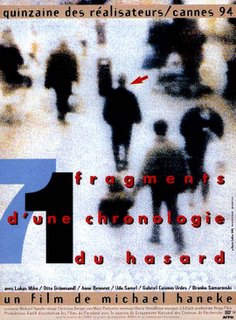71 Fragments of a Chronology of Chance by Michael Haneke
 71 Fragments starts by informing us that a young 19 year old student killed three people in a Viennese bank before shooting himself in the head. The film then shows, in exactly 71 disconnected shots (I didn't count), some random vignettes from the life of a bunch of characters and although the sequencing seems random, a narrative does emerge out of all this in the end, which manages to "explain" the freak incident.
71 Fragments starts by informing us that a young 19 year old student killed three people in a Viennese bank before shooting himself in the head. The film then shows, in exactly 71 disconnected shots (I didn't count), some random vignettes from the life of a bunch of characters and although the sequencing seems random, a narrative does emerge out of all this in the end, which manages to "explain" the freak incident.
Stylistically, it is a precursor to the similar but slightly superior Code Unknown that Haneke made in France. It is a similar tale of criss-crossing narrative, interstitial blackouts separating two scenes, scenes always ending in the middle of a dialogue etc etc. There are also lengthy and repeated media footage about the war in Sarajevo, Somalia and a curious news item about the trial of Michael Jackson on sex abuse charges. It rehearses his favourites theme about how media and TV contribute to social breakdown and individual alienation by providing us a false illusion of being connected with the reality and the world. There is a romanian refugee boy prowling the streets and living off the junk heaps. Then there is a couple who are having trouble with an exceptionally cold and distant girl who they are trying to adopt as a daughter. There is a long scene when a very needy old man just talks and talks to his daughter and grand-daughter on phone. The scene lasts for almost seven continuous minutes (yes I checked it) and it is extremely unnerving to see that old man so desperate to talk. There is another scene when a young man just keeps playing ping-pong with a mechanical ball thrower for what seems like eternity... The scene ends drastically although giving a feeling that he did feel unhinged and broke down after all. After all this the last shooting spree, although senseless and random, starts making sense in an abstract intellectual sort of way.
After the commercial and artistic success of Cache last year, Michael Haneke is at the peak of his career. May be that's the reason why the anthology film archives (full schedule here) in new york are showing a retrospective of his earlier films, which were never released in the US earlier. It is understandable why these films would have an extremely limited commercial appeal. More than the challenging and experimental narrative, it is the tone of these films, which is clinical, dry and forbiddingly intellectual, and the absence of humour, romance, happy endings or banal humanistic messages that will keep the casual audiences away. Their loss, that's what I say!
Short notices of the anthology retrospective from Village Voice, NYT and New York Sun. An essay on the film from the senses of cinema website here.
I had earlier written about Code Unknown, Cache, Funny Games and Seventh Continent. And a few days back about his movie adaptation of Kafka's The Castle.
No comments:
Post a Comment